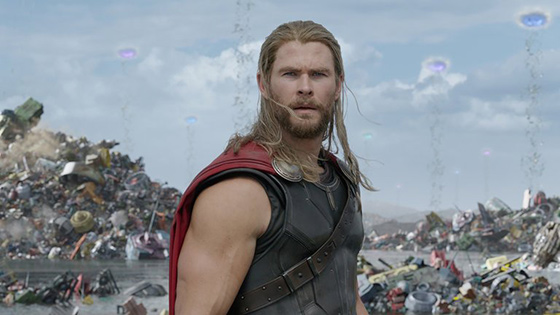Thor: Ragnarok

Chris Hemsworth in THOR RAGNAROK.

In the Poetic Edda, Ragnarök—”the final destiny of the gods”—brings an end to Odin, Loki, Thor and several other gods of Norse mythology. In the Marvel Cinematic Universe, it’s co-opted mostly to show off some cool CG animations, hurl a few baddies this way and that, and give a dud of a sub-franchise a much needed facelift vis-à-vis the comedic stylings of Chris Hemsworth and director Taika Waititi.
Suspended somewhere in the bowels of a fiery lair, a chained Thor (Hemsworth) listens captively as the smoldering demon Surtr (Clancy Brown) drones on in the usual expository monologue where the evil villain explains his evil plan. Naturally, Thor fights his way out of this prison and returns to Asgard with Surtr’s crown which leads to a series of events that releases Hela (Cate Blanchett). Possessing immense power, she threatens the destruction of the Nine Realms—Asgard and eight other worlds, including Earth.
Somewhere along this adventure, Thor and Loki (Tom Hiddleston) find themselves on a garbage-strewn planet ruled by an egomaniacal weirdo, the Grandmaster (Jeff Goldblum; who else?). Sakaar appears to be some kind of intergalactic dumping station. That’s merely a consequence of having various portals, including one that recalls the old joke about orifices, “Hotter than…” Also home to a kind of interplanetary gladiatorial tournament, Thor is reunited here with the reigning champion, Hulk/Bruce Banner (Mark Ruffalo) and introduced to the MCU’s first gaylien—Korg (an ad-libbing Waititi).
The film strongly leverages Hemsworth’s comic timing and openness to self-ridicule. Grandmaster is a scenery-chewing delight as Jeff Goldblum, or vice-versa? But Blanchett’s demigoddess feels impotent when relegated to CG-laden hand-to-hand combat—why, when she can snap her fingers and kill them all?
Inspired heavily by FLASH GORDON (1980), RAGNAROK is easily one of the most entertaining Marvel films. Yet, for all its brazen gags, its hip soundtrack (forking out the gross domestic product of a small nation-state for a couple verses of Led Zeppelin’s “Immigrant Song”), and its cool if somewhat hetero-normative heroes (Valkyrie and Korg, Tessa Thompson who could be an action star in her own right and Waititi, respectively, rep LGBT in the comics), the House That Steve Rogers Built doesn’t rush headlong into truly dangerous territory. Having exhausted multiple origin stories, each Marvel sequel is stuck perpetually recycling a “save the world” plot, just rearranging characters and settings. How many times can an immortal god of thunder come of age and find his place in the universe?